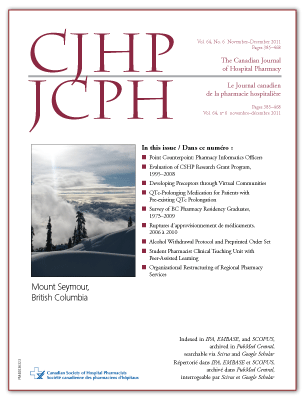Analysis of Orders for QTc-Prolonging Medication for Intensive and Cardiac Care Unit Patients with Pre-existing QTc Prolongation (QTIPPP Study)
DOI:
https://doi.org/10.4212/cjhp.v64i6.1082Keywords:
QTc interval, torsade de pointes, pre-existing prolongation, pharmacist practice, intervalle QTc, allongement préexistant de l’intervalle QTc, pratique du pharmacienAbstract
ABSTRACT
Background: A prolonged QTc interval on electrocardiography is often used as a surrogate marker for ventricular arrhythmia. Medications that can prolong the QTc interval may increase the risk of cardiac complications, although the exact incidence is unknown. It is reasonable to assume that administration of QTc-prolonging medications to patients with pre-existing QTc prolongation will further increase the risk of cardiac consequences. This study was designed to examine the frequency of prescription of QTc-prolonging medications in such patients and to explore the potential for clinical pharmacists to minimize the associated risks.
Objectives: The primary objective was to identify the number of patients with pre-existing prolonged QTc interval for whom QTc-prolonging medications were prescribed, from among all patients with orders for QTc-prolonging medications. The secondary objectives were to determine patterns of intervention by clinical pharmacists in these cases and to document any further QTc prolongation and occurrence of cardiac events.
Methods: A prospective, observational, quality assessment study was conducted over 4.5 months. Adult patients admitted to beds with cardiac monitoring by telemetry for whom one or more QTc-prolonging medications were ordered were eligible for inclusion. Patients were included if the QTc interval was longer than 450 ms on the most recent 12-lead electrocardiogram before the QTc-prolonging medication was ordered. These patients were followed to identify outcomes of interest after administration of QTc-prolonging medication.
Results: Overall, a QTc-prolonging medication was prescribed for 207 patients. Of these, 53 patients (26%) had pre-existing prolongation of the QTc interval. Clinical pharmacists made recommendations related to 28 medication orders; of these, 16 (57%) were accepted by the physician. Fifty-one (96%) of the 53 patients received at least one dose of QTc-prolonging medication and were monitored daily for complications. Nine (18%) of the 51 patients who underwent daily monitoring experienced at least one cardiac event.
Conclusions: A substantial proportion (26%) of patients for whom QTc-prolonging medications were prescribed had pre-existing prolongation of the QTc interval. Clinical pharmacists may have a role in reducing the risk of subsequent complications.
RÉSUMÉ
Contexte : Le L’allongement de l’intervalle QTc à l’électrocardiogramme est souvent utilisé comme critère de substitution d’arythmie ventriculaire. Les médicaments pouvant allonger l’intervalle QTc peuvent accroître le risque de complications cardiaques, bien que l’incidence exacte demeure inconnue. On peut raisonnablement prétendre que l’administration de médicaments allongeant l’intervalle QTc chez des patients présentant un allongement préexistant de l’intervalle QTc augmentera le risque de complications cardiaques. Cette étude a été conçue pour examiner la fréquence de prescription de médicaments allongeant l’intervalle QTc chez de tels patients et la possibilité pour les pharmaciens cliniciens de réduire au minimum les risques associés à cette situation.
Objectifs : Le principal objectif était de déterminer le nombre de patients présentant un allongement préexistant de l’intervalle QTc à qui l’on a prescrit des médicaments allongeant cet intervalle sur l’ensemble des patients à qui l’on a prescrit des médicaments allongeant l’intervalle QTc. Les objectifs secondaires étaient de déterminer les habitudes d’intervention par les pharmaciens cliniciens dans ces cas et de constater tout allongement supplémentaire de l’intervalle QTc et la survenue d’événements cardiaques.
Méthodes : Une étude d’évaluation qualitative, prospective et observationnelle a été menée sur une période de quatre mois. Les patients adultes hospitalisés avec surveillance cardiaque par télémétrie au chevet et à qui l’on prescrivait au moins un médicament allongeant l’intervalle QTc étaient admissibles à l’étude. Les patients étaient admis si l’intervalle QTc objectivé sur le plus récent ECG à 12 dérivations excédait 450 ms avant la prescription de médicaments allongeant l’intervalle QTc. Ces patients ont été suivis afin de déterminer les résultats d’intérêt après l’administration de tels médicaments.
Résultats : Dans l’ensemble, on a prescrit un médicament allongeant l’intervalle QTc à 207 patients. De ceux-ci, 53 (26 %) présentaient un allongement préexistant de l’intervalle QTc. Les pharmaciens cliniciens ont formulé des recommandations liées à 28 des prescriptions de ces médicaments; de ces recommandations, 16 (57 %) ont été acceptées par le médecin. De plus, 51 (96 %) des 53 patients ont reçu au moins une dose de médicament allongeant l’intervalle QTc et ont fait l’objet d’une surveillance quotidienne des complications. Neuf (18%) de ces 51 patients ont présenté au moins un événement cardiaque.
Conclusions : Une proportion considérable (26 %) des patients à qui l’on a prescrit un médicament allongeant l’intervalle QTc présentait un allongement préexistant de cet intervalle, ce qui porte à croire que les pharmaciens cliniciens pourraient avoir un rôle à jouer dans la réduction du risque de complications subséquentes.
Downloads
Published
Issue
Section
License
Copyright © Canadian Society of Healthcare-Systems Pharmacy.
After publication of a manuscript in the CJHP, the authors of the manuscript must obtain written permission from the CSHP (publications@cshp.ca) before reproducing any text, figures, tables, or illustrations from the work in future works of their own. If a submitted manuscript is declined for publication in the CJHP, all said rights shall revert to the authors. Please note that any forms (e.g., preprinted orders and patient intake forms) used by a specific hospital or other health care facility and included as illustrative material with a manuscript are exempt from this copyright transfer. The CJHP will require a letter from the hospital or health care facility granting permission to publish the document(s).










